French Bulldog vs English Bulldog Differences
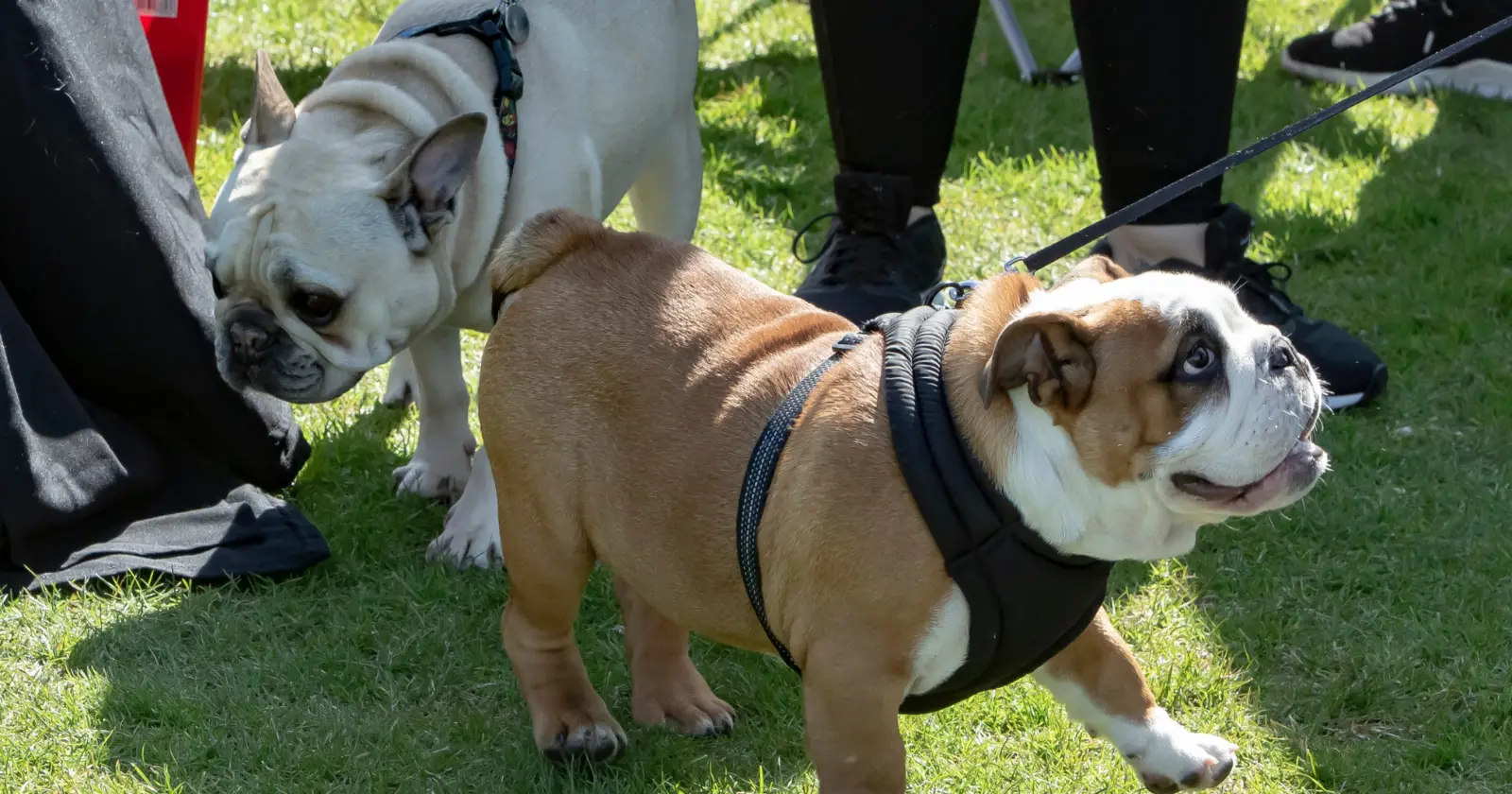
When it comes to choosing a bulldog as your furry companion, you might find yourself torn between the French Bulldog and the English Bulldog. These two breeds share some similarities, but they also have their unique differences. In this article, French Bulldog vs English Bulldog Differences, we’ll explore the key distinctions between these popular dog breeds to help you decide which one is the best fit for your family and lifestyle.
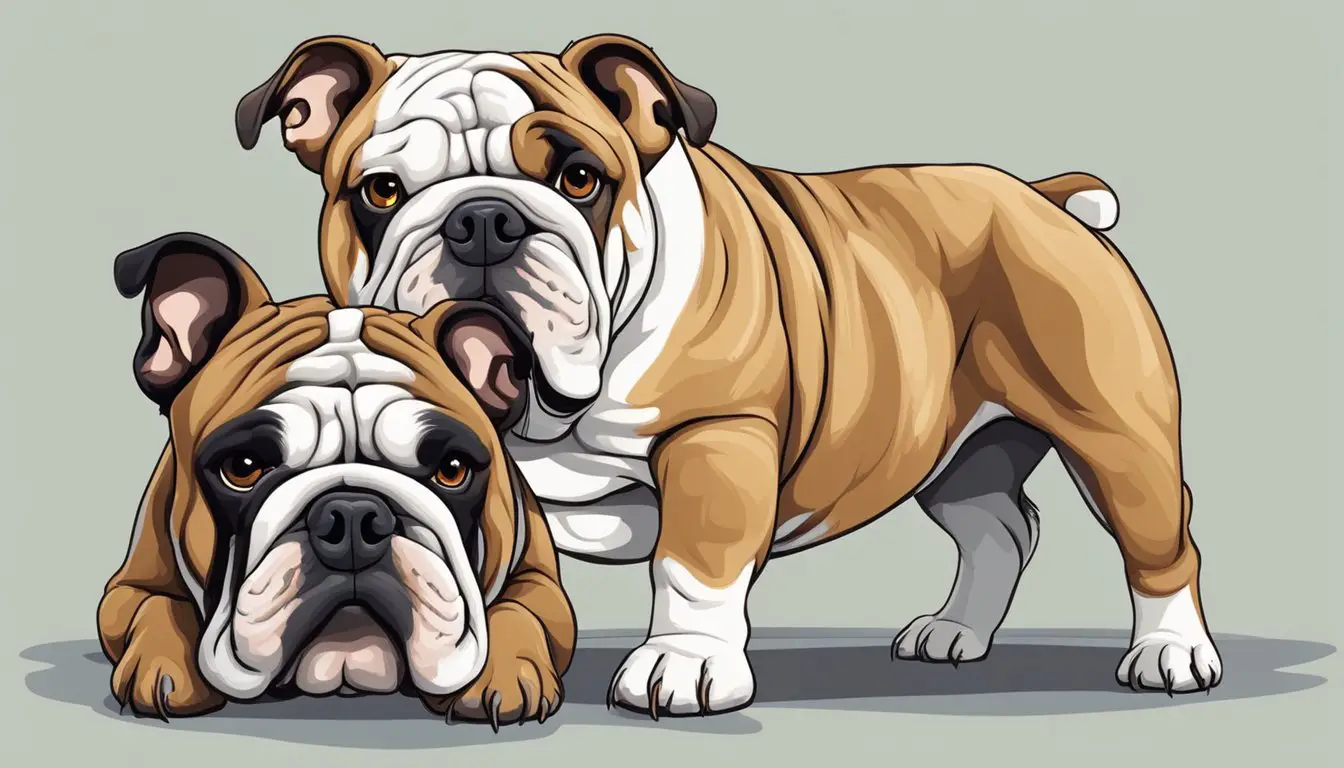
French Bulldogs and English Bulldogs both have their adorable quirks and charming characteristics. However, there are some notable differences in their sizes, energy levels, and health concerns. Knowing these dissimilarities will guide you in understanding their respective needs, as well as the commitment and care you’ll need to provide, should you decide to welcome one of these pups into your home.
Explore the distinct characteristics and charm that set French Bulldogs and English Bulldogs apart in this comprehensive guide to “French Bulldog vs English Bulldog Differences.” Let’s get started!
Contents
Key Takeaways
- Learn the differences in physical appearances such as size, stature, and weight between the French Bulldog and the English Bulldog.
- Examine their unique temperaments and energy levels to better assess suitability for your home and lifestyle.
- Address their health risks and lifespan concerns to make an informed choice and know what to expect in terms of care and maintenance.
Table of Contents
Overview of the Breeds
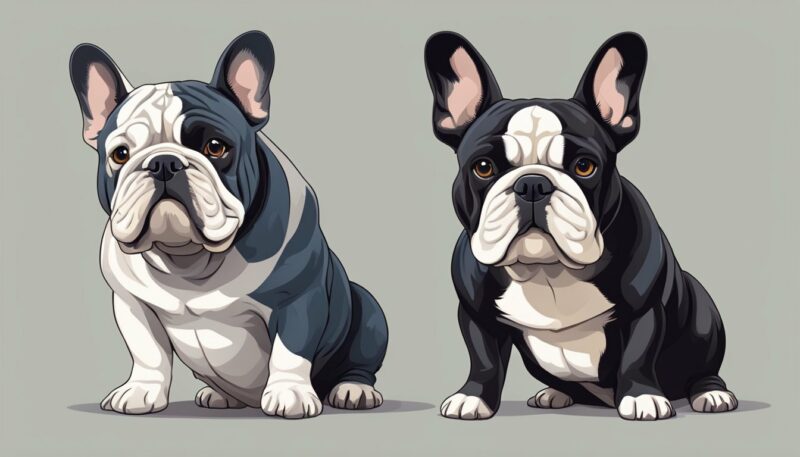
When comparing the two bulldog breeds, you’ll quickly notice differences in size, weight, and appearance. The English Bulldog is a medium-sized dog, typically weighing between 40-50 pounds and standing 12-16 inches tall at the shoulders ^(source). On the other hand, French Bulldogs are smaller in stature, usually weighing between 16-28 pounds and standing 11-12 inches tall ^(source).
In terms of appearance, both breeds share some similarities such as having a muscular build, wrinkled face, and distinctive pushed-in nose ^(source). However, the English Bulldog’s body tends to be more stout, with a meatier neck and a wider skull compared to the French Bulldog ^(source). Additionally, the English Bulldog often has more pronounced jowls, giving them a more distinctive look.
Despite their differences, both English and French Bulldogs are well-loved for their endearing personalities and loyalty to their owners. Each breed has its own unique set of attributes that make them suitable for various lifestyles and living situations. As you consider either of these dog breeds, it’s essential to keep in mind the specific needs and care requirements that come with raising a bulldog.
For example, both French and English Bulldogs are prone to certain health issues due to their brachycephalic (meaning short-nosed) skulls ^(source). They may experience breathing difficulties in hot weather and require careful monitoring during exercise. So, ensuring proper healthcare and living conditions for your bulldog breed of choice is crucial to ensure a happy, healthy, and thriving canine companion.
In summary, while French and English Bulldogs share some similarities, their differences in size, weight, and appearance make them unique in their own right. By understanding these distinctions, you can make an informed decision on which bulldog breed is the perfect fit for your lifestyle and home.
Characteristics and Temperament

When choosing between a French Bulldog and an English Bulldog, it’s essential to understand their unique characteristics and temperaments. You’ll find both breeds to be loyal and affectionate, making them excellent companions.
French Bulldogs are known for their playful, smart, and adaptable nature. They have a height of 11-12 inches and a weight of 20-28 pounds. Although they have low energy levels, they still enjoy short walks or play sessions, lasting about 20 minutes per day. Their small size and friendliness towards other dogs and people make them suitable for apartment living and families with children.
On the other hand, English Bulldogs are generally more relaxed and calm, with a height of 14-15 inches and a weight of 40-60 pounds. They also have low energy levels but prefer a more laid-back lifestyle. If you’re looking for a snuggly, warm, and dignified companion, the English Bulldog is a great match.
While both breeds are known to be affectionate, French Bulldogs tend to be more independent and energetic than their English counterparts. You might find your French Bulldog seeking out new adventures around your home, while your English Bulldog would be content to just settle in for a nap.
One significant factor to consider is intelligence and trainability. French Bulldogs are generally easier to train due to their quick-learning nature. However, both breeds can be stubborn, so it’s crucial to be patient and consistent with positive reinforcement during training.
Remember to consider the unique traits and temperament of each breed to make an informed decision to suit your lifestyle. By knowing your canine companion’s needs, you can provide them with the love and care they deserve.
Health and Lifespan Concerns

When it comes to health and lifespan, both French and English Bulldogs have some similarities and differences. As a potential dog owner, it’s essential to be aware of these concerns to ensure you can provide the best care for your furry friend.
French Bulldogs have an average lifespan of 10-12 years, while English Bulldogs typically live for only 8-10 years. Although these numbers might not seem significantly different, it can help you set realistic expectations for your future companion’s time with you.
Health issues are, unfortunately, quite common in both breeds. Some problems you might face with your French or English Bulldog include cherry eye, hip dysplasia, allergies, obesity, and joint problems. As a caring dog owner, it’s crucial to recognize the symptoms and get prompt veterinary attention for your pet.
Cherry Eye is a condition where the tear gland protrudes from the eye’s corner. It can affect both French and English Bulldogs and requires veterinary intervention to correct. Regularly checking your dog’s eyes can help you spot this problem early on.
Hip Dysplasia is another concern, particularly for English Bulldogs. This genetic condition causes abnormal development of the hip joint, which can lead to arthritis and pain. Be sure to keep an eye on your dog’s mobility and discuss any concerns with your veterinarian.
Allergies are prevalent in both breeds. These could be due to food, environmental factors, or even seasonal changes. Monitoring your dog’s skin and coat can help you stay on top of any allergies and seek appropriate treatment when necessary.
Obesity is a common issue for both French and English Bulldogs. As an owner, you should be mindful of your dog’s diet and exercise routine to help them maintain a healthy weight. Remember, a healthy dog is a happy dog!
Joint problems can occur for both breeds, particularly as they age. Regular vet checkups and providing joint supplements, as advised by your veterinarian, can help maintain your dog’s joint health.
Remember to keep a friendly and open line of communication with your veterinarian to address any concerns you may have about your dog’s health. Consistent care and attention to your pet’s needs will help you enjoy a long and happy life together.
Breed Origin and History
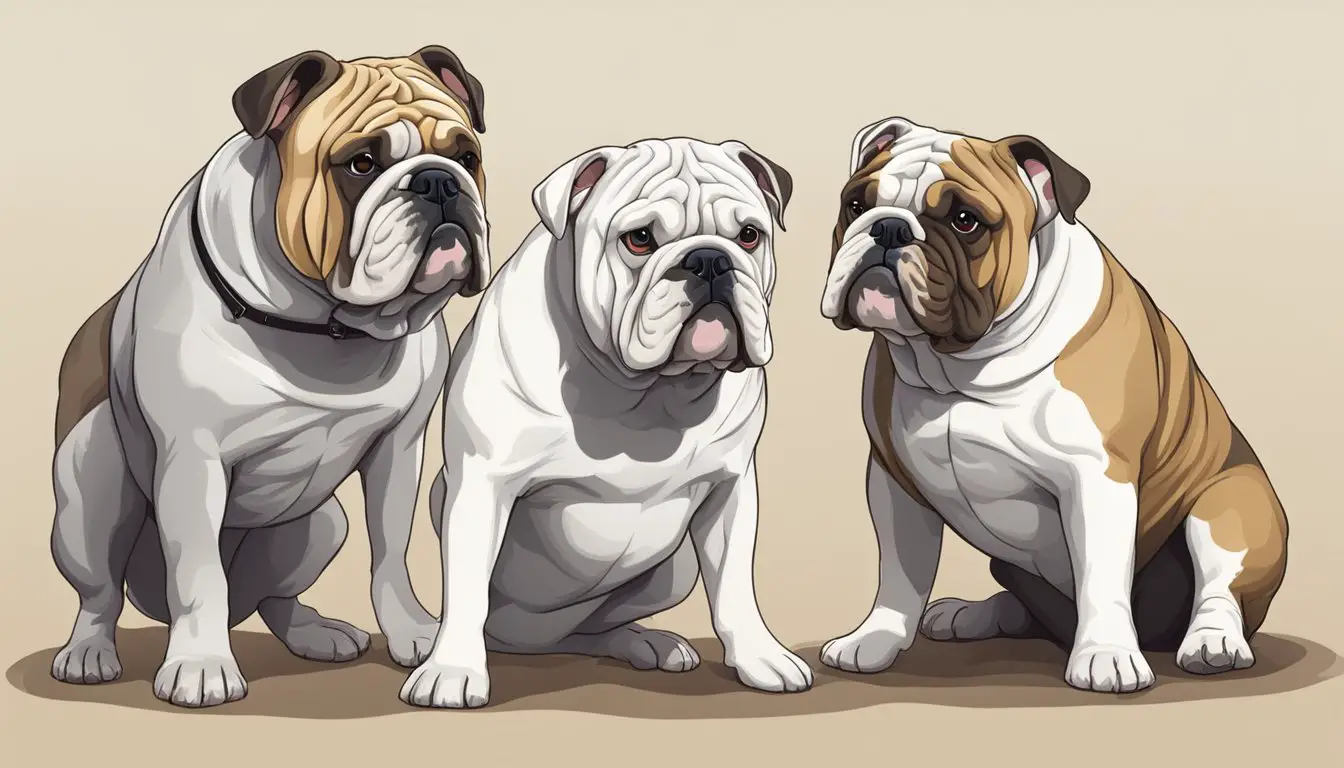
Have you ever wondered about the history of French Bulldogs and English Bulldogs? Let’s dive into their origins and how they became the breeds we know and love today.
French Bulldogs, also known as “Frenchies,” can trace their roots back to their British relative, the Bulldog. During the Industrial Revolution, lace-makers in Nottingham moved to France and brought their small Bulldogs with them. Over time, these Bulldogs were bred with other small dogs and developed the famous “bat ears” that set Frenchies apart today. This charming feature helped cement the French Bulldog’s popularity, and they soon became the breed we recognize today. You can learn more about the French Bulldog’s history here.
On the other hand, English Bulldogs have a more notorious past. This breed was originally developed for the brutal and inhumane sport of bull-baiting. Thanks to evolving social norms, bull-baiting was eventually banned, and the Bulldog’s role shifted to become a lovable companion animal. Over time, the English Bulldog transformed from a tenacious fighting dog to the gentle and affectionate breed we know today.
Some key differences between these two breeds are their size, weight, and life expectancy. French Bulldogs are smaller, weighing between 16-28 pounds, while English Bulldogs usually weigh between 40-50 pounds. Also, Frenchies have a longer life expectancy, living 10-14 years, whereas English Bulldogs typically live for 8-10 years. You can find a comparison of these breeds here.
Through the years, both French and English Bulldog breeders and clubs have made significant efforts to improve these breeds’ health and overall well-being. For example, the French Bull Dog Club of America has tirelessly worked since the 1980s to transform their annual specialty shows into major events that celebrate the love for Frenchies source.
So, the next time you look into the eyes of a Frenchie or an English Bulldog, you’ll know a bit more about their fascinating journey and how these breeds have evolved into the adorable companions we adore today.
Physical Appearance: French Bulldog vs English Bulldog Differences
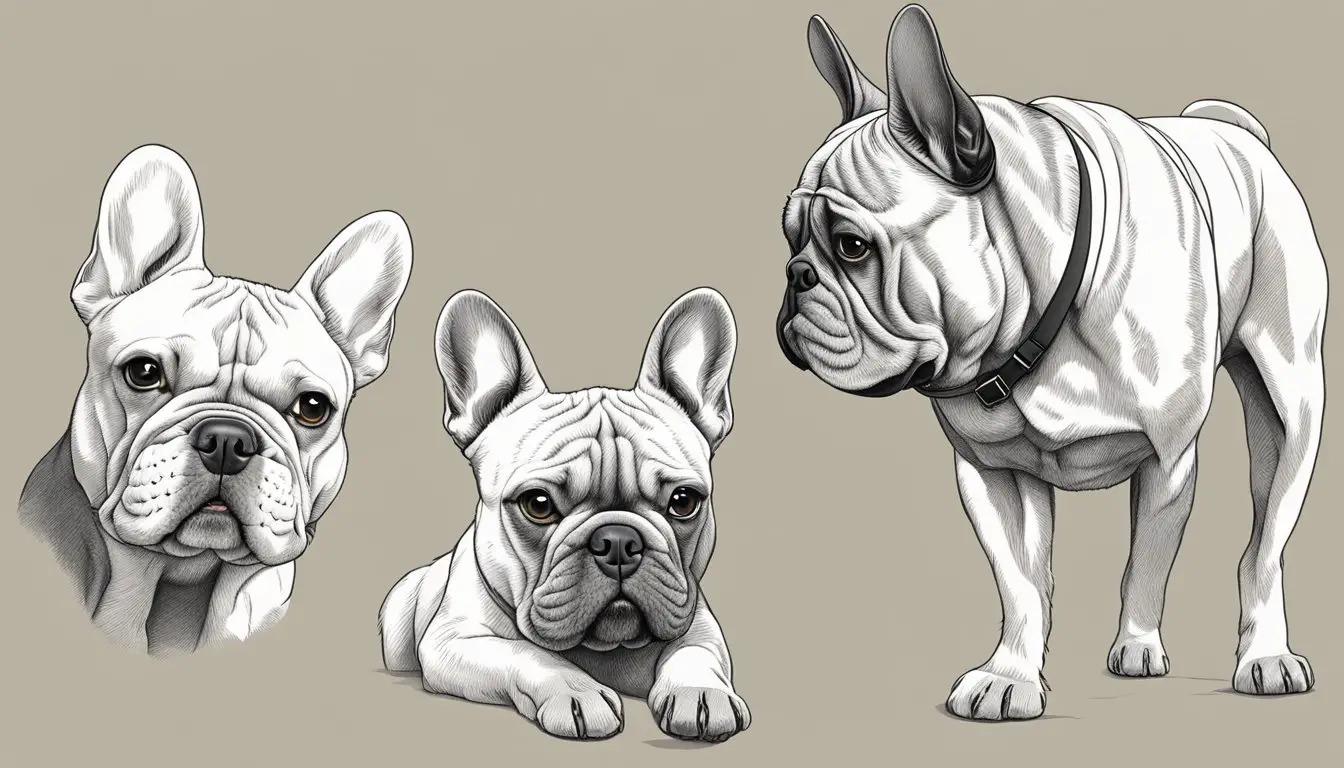
When comparing French Bulldogs and English Bulldogs, you’ll notice quite a few differences in their physical appearance. Let’s dive into some of the most notable distinctions between these two beloved breeds.
First and foremost, the most prominent difference between the French Bulldog and English Bulldog is their size. A French Bulldog typically measures 11 to 13 inches in height, whereas an English Bulldog can reach a height of 14 to 15 inches1. Additionally, Frenchies weigh around 10 to 15 kilograms while English Bulldogs can weigh up to 20 to 25 kilograms2.
As you observe the face of these two breeds, you’ll see that English Bulldogs have droopy chops that hang from both sides of their mouths, while French Bulldogs don’t have this characteristic3. Their ears also differ significantly: English Bulldogs have rose-shaped ears, whereas French Bulldogs are known for their large, bat-like ears that stand upright4.
The coat of French and English Bulldogs varies in color and texture. Both breeds can have a wide range of colors such as brindle, white, fawn, and more. However, the coat of a French Bulldog is generally short, smooth, and fine, while the English Bulldog’s coat is short, straight, and slightly rougher5. This difference in coat type affects their grooming needs, with English Bulldogs requiring less frequent grooming compared to French Bulldogs.
When it comes to wrinkles, both breeds are known for their adorable, wrinkly faces. English Bulldogs, however, tend to have more prominent wrinkles, particularly around their nose and forehead6. It’s crucial to keep these wrinkles clean and dry to prevent any skin irritations or infections.
Lastly, let’s talk about their tails. French Bulldogs usually have a small, corkscrew-shaped tail, while English Bulldogs have a straight or screw-like tail that is thicker at the base and tapers towards the tip7. Their tails also require proper attention and cleaning to ensure good hygiene and overall health.
Overall, while both French and English Bulldogs have their distinct features and physical attributes, understanding these differences will help you appreciate the unique charm each breed brings to the table.
Understanding their Energy Levels

When comparing French Bulldogs and English Bulldogs, one key aspect to consider is their energy levels. While both breeds are known for their unique charms, understanding their respective energy levels can help you choose the right companion for your lifestyle.
French Bulldogs typically have a fairly low energy level as adults compared to other breeds. However, there are exceptions to this rule, and don’t be surprised if you find a Frenchie with higher energy levels even well beyond their puppy years source. On the other hand, English Bulldogs are much more passive. They tend to sleep and lay around more than their French counterparts, and this sedentary nature is the primary reason for most of their health issues source.
Exercise needs:
When it comes to exercise, both breeds do not require rigorous workouts. A daily walk or a light play session should suffice to keep your French Bulldog happy and healthy. English Bulldogs have similar exercise requirements, but keep in mind their tendency to overheat.
Separation anxiety:
Separation anxiety is not uncommon in both breeds, although their energy levels can play a role in their behavior. A French Bulldog with higher energy levels might be more prone to anxiety when left alone for extended periods, while an English Bulldog may be more laid-back and content with some solo relaxation time.
Overheating:
Remember that both breeds are susceptible to overheating, which can be common in brachycephalic (short-nosed) dogs. Keep exercise sessions short and avoid hot weather as much as possible. Providing a comfortable environment with access to shade and water will help prevent complications due to overheating.
With this information in mind, it’s easier to determine which breed suits your lifestyle better. If you prefer a slightly more energetic companion, a French Bulldog might be the ideal choice. However, if you’re looking for a laid-back buddy who enjoys lounging around, an English Bulldog could be the perfect fit.
Care and Maintenance

Taking care of your French or English Bulldog may seem daunting at first, but fret not! Both breeds require similar care and maintenance, and with a bit of patience and love, you’ll have a happy and healthy companion by your side. Let’s dive in.
When it comes to grooming needs, both French and English Bulldogs have relatively low-maintenance coats. Regular brushing and occasional bathing can help keep their coats looking healthy and shiny. Keep an eye on their facial folds, as they can be prone to irritation and infection. Gently clean these areas regularly to avoid any issues.
Training your Bulldog may require a bit of patience, as they can be quite stubborn at times. However, this doesn’t mean they’re impossible to train! Using positive reinforcement techniques, such as praise and treats, can work wonders in making the training process enjoyable and efficient for both you and your pup.
When considering pet insurance for your Bulldog, it’s essential to research and compare different policies. Bulldogs can be prone to certain health issues, and having the right insurance coverage could help ease potential expenses down the line.
As family pets, both French and English Bulldogs are known for their affectionate and friendly nature. They typically get along wonderfully with children, making them a fantastic addition to families with kids. Just make sure to supervise playtime and teach your little ones how to interact with dogs in a loving and respectful manner.
In conclusion, caring for a French or English Bulldog may require a bit of extra attention due to their unique traits and potential health issues, but the love and companionship they provide are well worth the effort. Keep up with regular grooming, positive reinforcement training, and invest in proper pet insurance, and you’ll have a wonderful and fulfilling life with your Bulldog.
French Bulldog vs English Bulldog | Which one is Better for you?
Cost Implications
So, you’re considering adding a French Bulldog or an English Bulldog to your family, and you’re curious about the financial side of things. No worries, we’ve got you covered! In this section, we’ll talk about the costs associated with purchasing and owning one of these adorable bulldog breeds.
When it comes to the initial price, both breeds can be relatively expensive due to their popularity. Generally, the cost of a French Bulldog puppy ranges from $2,000 to $7,000, while an English Bulldog may set you back anywhere from $1,500 to $4,000. However, these figures can vary greatly depending on factors such as pedigree, breeder reputation, and location.
Now, let’s talk about ongoing costs. Both breeds require regular vet checkups, vaccinations, and grooming, so it’s essential to budget for these expenses as well. French Bulldogs, for example, are prone to certain health issues like respiratory problems and allergies, which may result in additional medical costs. English Bulldogs, on the other hand, can experience health problems such as hip dysplasia and skin infections. Be prepared for potential healthcare costs related to these issues.
When looking for a reputable breeder, always do thorough research and ensure they adhere to ethical breeding standards. A well-reputed breeder will prioritize the health and well-being of their dogs, reducing the likelihood of potential health issues down the road. Furthermore, they can provide you with valuable information and support throughout your dog ownership journey.
To sum it up, owning a French or an English Bulldog comes with some financial responsibility. However, with proper research and budgeting, you can confidently navigate the cost implications associated with these lovable canine companions. Keep in mind that the expenses of owning a dog are not only about the initial purchase price but also the ongoing costs related to their healthcare and well-being. So make sure to plan accordingly before bringing your new furry friend home!
Closing Thoughts
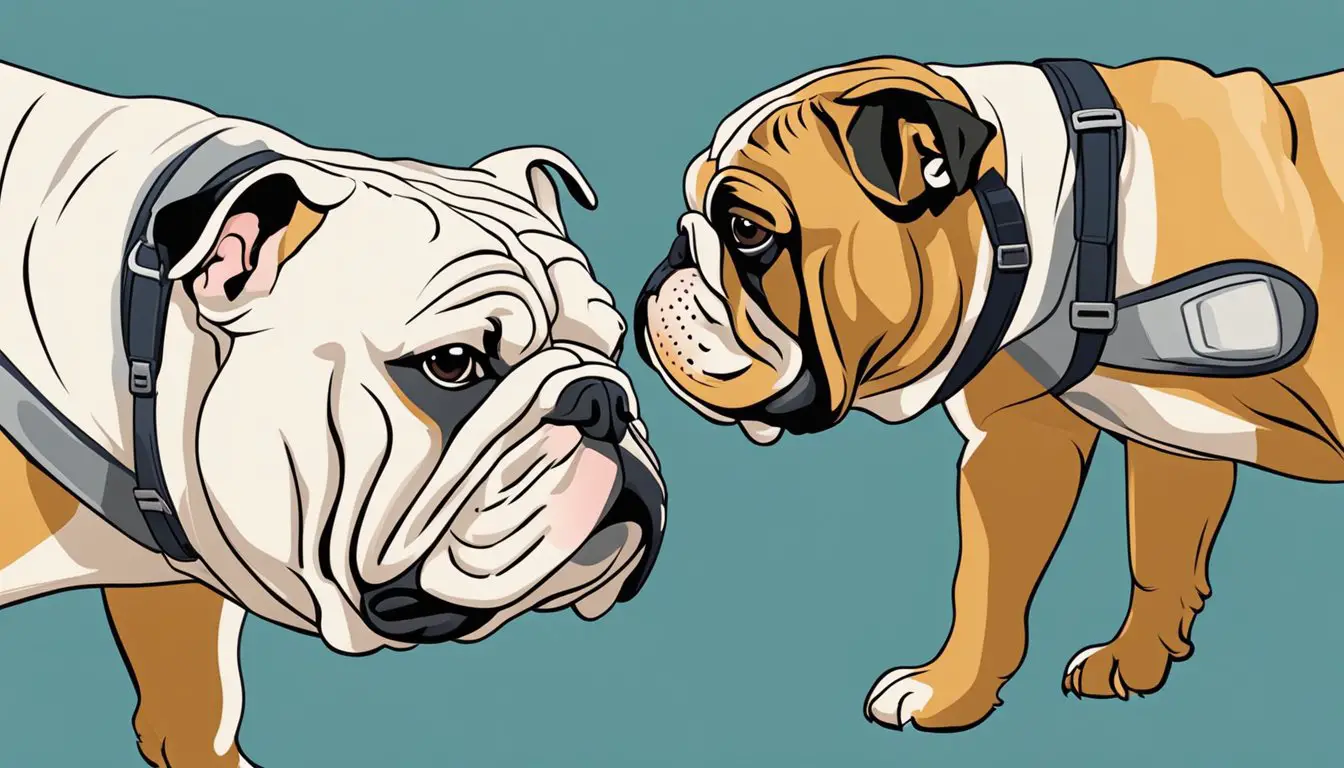
So, you’re considering adopting a French Bulldog or an English Bulldog and would like to know the key differences between these charming breeds. Well, you’re in luck! Let’s dive into what sets them apart and how they can fit into your lifestyle as family dogs.
Firstly, when it comes to size, French Bulldogs are smaller and weigh between 16-28 pounds, whereas English Bulldogs are more substantial, weighing between 40-60 pounds. Despite their differences in size, both breeds are known for their endearing personalities. They’re known to be intelligent, affectionate, and playful, making them fantastic companions.
As a potential dog owner, keep in mind that Frenchies tend to live longer, with a life span of 10-14 years, compared to the English Bulldogs’ life span of 8-10 years. This may be an essential factor to consider while choosing your new furry friend.
While both breeds boast similarities in their affectionate nature and loyalty towards their owners, they also have some differences in their personalities. French Bulldogs are generally more energetic, which means they might require more playtime and exercise than their English counterparts. On the other hand, English Bulldogs are known for their laid-back attitudes, making them true “lap dogs” who love cuddling up with their owners.
Now that you’ve got a better understanding of these lovable breeds, remember to consider your lifestyle, living space, and the amount of time you can dedicate to your pet. Whether you decide on a French Bulldog or an English Bulldog, you’re bound to have a loving and loyal companion for years to come. Happy adopting!
Frequently Asked Questions
What are the main physical differences between French and English Bulldogs?
French and English Bulldogs have visible differences in size and appearance. English Bulldogs are short but stout, standing at 14-15 inches tall and weighing up to 50 pounds source. On the other hand, French Bulldogs are generally smaller, with a height of around 11-12 inches and a weight between 20-28 pounds source.
How do their temperaments compare?
Both breeds have distinct temperaments, with French Bulldogs being playful, smart, and adaptable source. English Bulldogs, however, are known for their friendly, courageous, and calm demeanor source. While they share a common lineage, their personalities can vary, making them suitable for different families and lifestyles.
Which breed has fewer health issues?
Both French and English Bulldogs are prone to certain health issues due to their brachycephalic (short-nosed) and stocky nature. However, English Bulldogs tend to have more health problems than French Bulldogs, with a below-average health rating for both breeds source. It’s important to research and be prepared for potential health concerns before adopting either breed.
Are there differences in exercise needs?
Both breeds have low energy levels, making them suitable for families with a more sedentary lifestyle source. While neither requires extensive exercise, regular short walks and play sessions will help keep your dog happy and healthy. Always monitor their breathing and exertion levels to avoid overexertion in brachycephalic breeds.
Do French and English Bulldogs have similar grooming requirements?
French Bulldogs tend to shed less frequently and in smaller amounts compared to English Bulldogs source. However, both breeds require regular grooming, including brushing, nail trimming, and cleaning of facial wrinkles to maintain proper hygiene. Consistent grooming routines will help minimize shedding and maintain the health of your dog’s coat.
Is there a significant difference in their lifespan?
There is a noticeable difference in the average lifespan of each breed. French Bulldogs typically have a lifespan of 10-14 years, while English Bulldogs have a shorter lifespan of 8-10 years source. Ensuring proper care, including a healthy diet, regular exercise, and prompt attention to any health concerns, can help maximize the length and quality of their lives.
Footnotes
-
https://www.loveyourdog.com/french-bulldog-vs-english-bulldog/ ↩
-
https://blueeyesbulldogs.com/french-english-bulldog-differences/ ↩
-
https://www.rover.com/blog/english-bulldog-vs-french-bulldog-whats-the-difference/ ↩
-
https://bulldogger.dog/french-bulldog-versus-english-bulldog-unraveling-the-differences/ ↩
-
https://www.rover.com/blog/english-bulldog-vs-french-bulldog-whats-the-difference/ ↩
-
https://pethelpful.com/dogs/A-Guide-to-the-Different-Types-of-Bulldogs ↩
-
https://www.rover.com/blog/english-bulldog-vs-french-bulldog-whats-the-difference/ ↩






